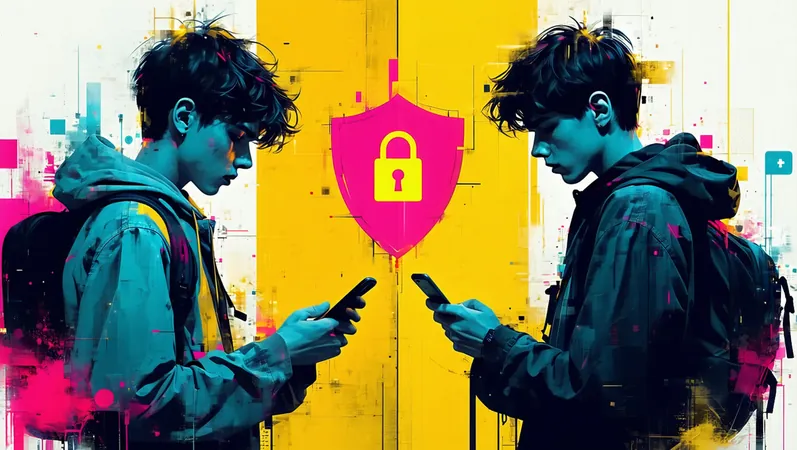
Alarming Cybersecurity Trends: Gen Z and Millennials Most at Risk for Social Media Breaches!
2025-01-13
Author: Wei
Introduction
In a startling revelation, nearly half of both Gen Z and Millennials admit that their social media passwords have been compromised, sparking urgent conversations about cybersecurity practices among different generations. According to the recent *2024 State of Global Authentication* survey by Yubico, the data underscores a growing vulnerability among younger digital users as they face significant cybersecurity threats.
Survey Findings
The survey discovered that a staggering 47% of Gen Z respondents and 46% of Millennials have fallen victim to social media password breaches. This alarming trend highlights the pressing need for enhanced cybersecurity measures as phishing attacks and AI-driven cybercrimes increase in sophistication and prevalence.
Generational Differences in Cybersecurity Attitudes
Young adults today demonstrate a noticeable shift in their approach to cybersecurity compared to older generations. While they are more aware of new security technologies, such as hardware security keys, their reliance on traditional usernames and passwords is decreasing sharply. In contrast, older generations like Baby Boomers and Gen X continue to place significant faith in conventional authentication methods.
Expert Insights
Ronnie Manning, Chief Brand Advocate at Yubico, shared insights into the evolving mindset towards security across generations: “Attitudes toward cybersecurity are changing globally. We see a decline in respect for traditional password methods and an encouraging rise in the adoption of modern multi-factor authentication (MFA) tools.” Manning emphasized the distinct anxiety that Gen Z harbors regarding online safety, stating, “This generation is particularly vocal about their cybersecurity concerns, with breaches making headlines more frequently.”
Concerns About Corporate Data Protection
The survey also revealed a widespread sense of unease regarding organizational data protection, with 42% of participants wondering if companies are truly doing enough to safeguard their personal information. Interestingly, this skepticism varies with age; around 50% of Baby Boomers still trust traditional security measures, while only 35% of Gen Z believe the same.
AI and Cyber Threats
Concerns about AI's role in amplifying cyber threats are especially prevalent among Gen Z, with 73% voicing worries over increasingly sophisticated AI scams. This demographic's heightened awareness is essential in navigating today's treacherous online landscape.
Proactive Steps for Cybersecurity
Derek Hanson, Yubico's Vice President of Standards and Alliances, urged individuals to take proactive steps in 2025 to bolster their internet security. He emphasized the necessity of enabling multi-factor authentication wherever it’s available. “Check all of your frequently used online accounts and enable MFA to thwart phishing attempts,” he advised. He also highlighted the benefits of hardware security keys, like the YubiKey, which provide robust protection against unauthorized access across numerous applications.
Important Security Practices
Furthermore, Hanson stressed the importance of verifying the identities of email senders: “Always scrutinize the sender’s address to ensure they are who they claim to be. If you encounter suspicious emails or messages, reach out directly to the respective organization for verification.” As an added measure, he recommended utilizing password managers to enhance security.
Conclusion
This data from Yubico serves as a wake-up call about the urgent need for comprehensive cybersecurity education. Everyone, from individual users to corporations, must adopt secure authentication strategies and cultivate awareness about the importance of cybersecurity tools. With rising cyber threats looming, taking proactive steps could spell the difference between security and vulnerability in this digital age.
Call to Action
Are you prepared for the next wave of cyber threats?



 Brasil (PT)
Brasil (PT)
 Canada (EN)
Canada (EN)
 Chile (ES)
Chile (ES)
 Česko (CS)
Česko (CS)
 대한민국 (KO)
대한민국 (KO)
 España (ES)
España (ES)
 France (FR)
France (FR)
 Hong Kong (EN)
Hong Kong (EN)
 Italia (IT)
Italia (IT)
 日本 (JA)
日本 (JA)
 Magyarország (HU)
Magyarország (HU)
 Norge (NO)
Norge (NO)
 Polska (PL)
Polska (PL)
 Schweiz (DE)
Schweiz (DE)
 Singapore (EN)
Singapore (EN)
 Sverige (SV)
Sverige (SV)
 Suomi (FI)
Suomi (FI)
 Türkiye (TR)
Türkiye (TR)